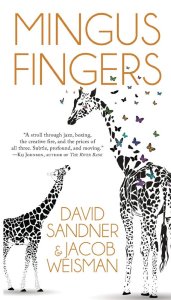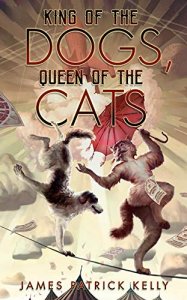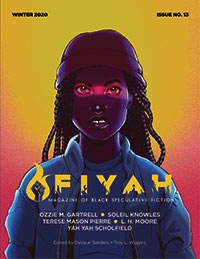Paul Di Filippo Reviews Novellas by David Sandner & Jacob Weisman, Robert Levy, and James Patrick Kelly
 Mingus Fingers, David Sandner & Jacob Weisman (Fairwood 978-1933846873, $8, 68pp, trade paperback) November 2019
Mingus Fingers, David Sandner & Jacob Weisman (Fairwood 978-1933846873, $8, 68pp, trade paperback) November 2019
The boom in novellas shows no signs of petering out, as their bite-sized yet sufficiently mouth-filling substantiality continues to appeal to readers who want more than a short story but less than a novel. Here we have a go at three recent fine examples of the form.
If I had a time machine, one of my first chronospatial destinations would be Greenwich Village in the late fifties, where I’d catch live performances by all the jazz greats current then. In fact, I wrote a tribute story to this daydream, titled “Candle in a Chianti Bottle.” So I totally grooved to Mingus Fingers, a similar evocation of a vanished stellar era, San Francisco’s bebop heyday of the early nineteen fifties. The team behind this charming, low-key but powerful tale—David Sandner & Jacob Weisman—blend their voices beautifully into an organic whole that reminds me of the tonality of John Kessel or Karen Joy Fowler. ISFDB reveals that the two have been collaborating since 1992—a surprise to me, since I had never really twigged to publisher Weisman’s fiction forays—and so this duration of partnership would explain the easy facility of this tale.
Our unnamed first-person narrator is a young black man who has dual careers: trumpet player and boxer. The former is his true love, the latter provides a hazardous makeshift paycheck. The plot of the book is rather loose and freeform, befitting the thematic jazz expressionism. Our man faces a crucial time in the ring, and also learns from the great Charles Mingus the supernatural side to the music, where impassioned blowing opens a portal to “the underworld,” a land of mutable forms and revelations. Into this mix is added guardianship of our hero’s nephew, Kenny, who must be taught how to unlock his own musical potential.
The characterization here is superb, with all the players leaping off the page with subtle grace. The evocation of the period is spot-on, subtle and not overdone. The parallel worlds of boxing and jazz extend fine tendrils of correlation into each other. The doings of the actors are multivalent and authentic. And the unreductionist climax rings true. All in all, a wonderful accomplishment, not alone for sentences such as “I looked at Mingus. He had changed, his impossibly spotted neck bent almost to breaking as he loomed over us over us… [as he] moved his hooves along the strings….”
 Anaïs Nin at the Grand Guignol, Robert Levy (Lethe 978-1590217177, $13, 170pp, trade paperback) October 2019
Anaïs Nin at the Grand Guignol, Robert Levy (Lethe 978-1590217177, $13, 170pp, trade paperback) October 2019
Robert Levy made his fiction debut, researches tell me, in 2014, with a short story in a Michael Kelly-helmed anthology. Regrettably, I have not tracked his productive career since that day which seems like just an eyeblink ago, but which of course is a full six years gone. So I am happy now to remedy my negligence by enjoying his Anaïs Nin at the Grand Guignol, which enchants right from the evocative title. Rather in line with Mingus Fingers, it also seeks to bring to life a colorful vanished era in which a compelling supernatural tale can be told. In this case, it’s Paris of 1934, and we might hark to both Woody Allen’s Midnight in Paris and, as we shall see, Philip Kaufman’s Henry & June.
The first accomplishment of note here is that Levy chooses to inhabit the soul of Anaïs Nin herself and tell the tale in her own voice. Now, I’ve never read Nin’s famous diaries, but have read all her erotic fiction, and am easily seduced into accepting Levy’s performance as authentic. I think you will be too. Nary a false note.
We encounter Nin when she is at a sea-change time of life. Married to loyal loving Hugo, yet having an affair with Henry Miller on the side, while longing for Henry’s fled wife June, with whom Nin is also in love, our female writer is seeking understanding and solace on the compositional page, but also in the dark imaginings of the Grand Guignol theater. There she befriends a haunted actress named Maxa. It proves that Maxa’s shocking and transgressive acting abilities owe their power to the fact that she has more or less sold her spirit to the demon lover Monsieur Guillard. “He is a storm demon, fashioned from the very depths of the abyss itself.” And now Guillard has his eye on Nin as his next conquest.
The tale alternates beautifully between domestic moments revelatory of character and place and dramatic Buffy-style critter-hunting. Levy’s prose is elegant and restrained without being fussy or lifeless. His action sequences are fully as suspenseful as his philosophizing is deep. The book strikes the perfect balance between the quotidian and the fantastical.
Readers who enjoyed Richard Kadrey’s The Grand Dark will surely relish this fervid bit of subtle decadence, and vice versa.
 King of the Dogs, Queen of the Cats, James Patrick Kelly (Subterranean 978-1596069343, $40, 128pp, hardcover) January 2020
King of the Dogs, Queen of the Cats, James Patrick Kelly (Subterranean 978-1596069343, $40, 128pp, hardcover) January 2020
If Rudy Rucker and Charles Stross had decided to reboot the Instrumentality stories of Cordwainer Smith, they might have come close to what Jim Kelly achieves in his sparkling, zesty, inventive, covertly philosophical new novella King of the Dogs, Queen of the Cats. Although the story’s immediate venue is restricted to the single planet named Boon, and just one city thereon, the deep galactic background renders this a space opera in full.
Boon was self-isolated from the greater galactic polity for centuries before reopening its doors to outsiders. In that time, a curious culture developed there. The Grand Houses, populated by human clone lineages, rule society, which is composed of plebian humans, and uplifted dogs and cats. Fully sentient and equipped with useful paws, the chimeras are nominally equal, but in reality serve as an underclass of servants and laborers.
All of this backstory, plus more, is not infodumped, but rather conveyed with devious veteran’s skill, piecemeal, through instant heady immersion into the wild life of Gio Barbaro, young scion of Grand House Barbaro. Dominated by fussy elder clone Fra and their shared wife Hali, rebellious Gio is slowly disinvesting himself from the ruling hierarchy. He wants to go “upside,” out to the stars. And when a strange travelling interstellar circus arrives in town, he thinks he might have found his escape route. The fact that the circus has also hired the saucy and devil-may-care gal named Kly, one of Gio’s elite peers, is added inducement to split.
Kelly has a ball telling this story. It’s as full of whimsy, drollery and brio as anything by Jack Vance. Meanwhile, it has the solid underpinnings of an Alistair Reynolds scenario. The nature and functionality and characters of the cat-people and dog-people are polished and convincing. Gio is an affable, empathizable protagonist, and his plight is classically resonant. The action moves forward at whiplike speed, and once the reader is immersed, everything is crystal clear, but with surprises galore still continuously unpacking.
And beneath the surface storytelling sheen lies the hard issues involving prejudice and justice, conservatism versus expansionism, power, privilege and pride. Kelly never lectures, but lays everything out in a manner to induce thoughtful responses.
I don’t think it’s belittling the maturity level or sophistication of this novella to say it also reminds me of the best of Andre Norton. The youthful longings, the cross-species bonding, the exotic culture—these were always key items in Norton’s catalogue which enticed many a young reader into the realm of fantastika. Kelly is on some level channeling this “Golden age of SF is thirteen” spirit into a fully adult work. That’s how he and the genre stay forever young!
 While you are here, please take a moment to support Locus with a one-time or recurring donation. We rely on reader donations to keep the magazine and site going, and would like to keep the site paywall free, but WE NEED YOUR FINANCIAL SUPPORT to continue quality coverage of the science fiction and fantasy field.
While you are here, please take a moment to support Locus with a one-time or recurring donation. We rely on reader donations to keep the magazine and site going, and would like to keep the site paywall free, but WE NEED YOUR FINANCIAL SUPPORT to continue quality coverage of the science fiction and fantasy field.






